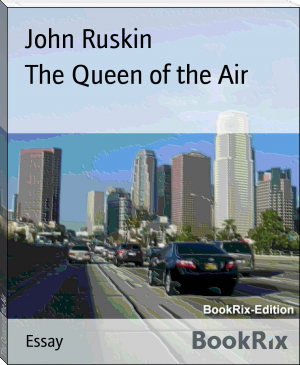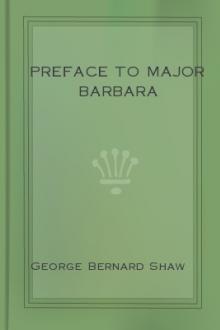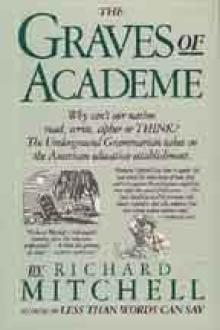The Queen of the Air, John Ruskin [classic novels for teens .TXT] 📗

- Author: John Ruskin
Book online «The Queen of the Air, John Ruskin [classic novels for teens .TXT] 📗». Author John Ruskin
degree which I think no human republican could by any philosophy exalt himself to. There is no courtesy in him; he does not care whether it is king or clown whom he teases; and in every step of his swift mechanical march, and in every pause of his resolute observation, there is one and the same expression of perfect egotism, perfect independence and self-confidence, and conviction of the world's having been made for flies. Strike at him with your hand, and to him, the mechanical fact and external aspect of the matter is, what to you it would be if an acre of red clay, ten feet thick, tore itself up from the ground in one massive field, hovered over you in the air for a second, and came crashing down with an aim. That is the external aspect of it; the inner aspect, to his fly's mind, is of a quite natural and unimportant occurrence--one of the momentary conditions of his active life. He steps out of the way of your hand, and alights on the back of it. You cannot terrify him, nor govern him, nor persuade him, nor convince him. He has his own positive opinion on all matters; not an unwise one, usually, for his own ends; and will ask no advice of yours. He has no work to do--no tyrannical instinct to obey. The earthworm has his digging; the bee her gathering and building; the spider her cunning network; the ant her treasury and accounts. All these are comparatively slaves, or people of vulgar business. But your fly, free in the air, free in the chamber--a black incarnation of caprice, wandering, investigating, flitting, flirting, feasting at his will, with rich variety of choice in feast, from the heaped sweets in the grocer's window to those of the butcher's back-yard, and from the galled place on your cab-horse's back, to the brown spot in the road, from which, as the hoof disturbs him, he rises with angry republican buzz--what freedom is like his?
For captivity, again, perhaps your poor watch-dog is as sorrowful a type as you will easily find. Mine certainly is. The day is lovely, but I must write this, and cannot go out with him. He is chained in the yard because I do not like dogs in rooms, and the gardener does not like dogs in gardens. He has no books,--nothing but his own weary thoughts for company, and a group of those free flies, whom he snaps at, with sullen ill success. Such dim hope as he may have that I may take him out with me, will be, hour by hour, wearily disappointed; or, worse, darkened at once into a leaden despair by an authoritative "No"--too well understood. His fidelity only seals his fate; if he would not watch for me, he would be sent away, and go hunting with some happier master: but he watches, and is wise, and faithful, and miserable; and his high animal intellect only gives him the wistful powers of wonder, and sorrow, and desire, and affection, which embitter his captivity. Yet of the two, would we rather be watch-dog or fly?
Indeed, the first point we have all to determine is not how free we are, but what kind of creatures we are. It is of small importance to any of us whether we get liberty; but of the greatest that we deserve it. Whether we can win it, fate must determine; but that we will be worthy of it we may ourselves determine; and the sorrowfullest fate of all that we can suffer is to have it without deserving it.
I have hardly patience to hold my pen and go on writing, as I remember (I would that it were possible for a few consecutive instants to forget) the infinite follies of modern thought in this matter, centred in the notion that liberty is good for a man, irrespectively of the use he is likely to make of it. Folly unfathomable! unspeakable! unendurable to look in the full face of, as the laugh of a cretin. You will send your child, will you, into a room where the table is loaded with sweet wine and fruit--some poisoned, some not?--you will say to him, "Choose freely, my little child! It is so good for you to have freedom of choice; it forms your character--your individuality! If you take the wrong cup or the wrong berry, you will die before the day is over, but you will have acquired the dignity of a Free child?"
You think that puts the case too sharply? I tell you, lover of liberty, there is no choice offered to you, but it is similarly between life and death. There is no act, nor option of act, possible, but the wrong deed or option has poison in it which will stay in your veins thereafter forever. Never more to all eternity can you be as you might have been had you not done that--chosen that. You have "formed your character," forsooth! No; if you have chosen ill, you have De-formed it, and that for ever! In some choices it had been better for you that a red-hot iron bar struck you aside, scarred and helpless, than that you had so chosen. "You will know better next time!" No. Next time will never come. Next time the choice will be in quite another aspect-- between quite different things,--you, weaker than you were by the evil into which you have fallen; it, more doubtful than it was, by the increased dimness of your sight. No one ever gets wiser by doing wrong, nor stronger. You will get wiser and stronger only by doing right, whether forced or not; the prime, the one need is to do that, under whatever compulsion, until you can do it without compulsion. And then you are a Man.
"What!" a wayward youth might perhaps answer, incredulously, "no one ever gets wiser by doing wrong? Shall I not know the world best by trying the wrong of it, and repenting? Have I not, even as it is, learned much by many of my errors?" Indeed, the effort by which partially you recovered yourself was precious; that part of your thought by which you discerned the error was precious. What wisdom and strength you kept, and rightly used, are rewarded; and in the pain and the repentance, and in the acquaintance with the aspects of folly and sin, you have learned something; how much less than you would have learned in right paths can never be told, but that it is less is certain. Your liberty of choice has simply destroyed for you so much life and strength never regainable. It is true, you now know the habits of swine, and the taste of husks; do you think your father could not have taught you to know better habits and pleasanter tastes, if you had stayed in his house; and that the knowledge you have lost would not have been more, as well as sweeter, than that you have gained? But "it so forms my individuality to be free!" Your individuality was given you by God, and in your race, and if you have any to speak of, you will want no liberty. You will want a den to work in, and peace, and light--no more,--in absolute need; if more, in anywise, it will still not be liberty, but direction, instruction, reproof, and sympathy. But if you have no individuality, if there is no true character nor true desire in you, then you will indeed want to be free. You will begin early, and, as a boy, desire to be a man; and, as a man, think yourself as good as every other. You will choose freely to eat, freely to drink, freely to stagger and fall, freely, at last, to curse yourself and die. Death is the only real freedom possible to us; and that is consummate freedom, permission for every particle in the rotting body to leave its neighbor particle, and shift for itself. You call it "corruption" in the flesh; but before it comes to that, all liberty is an equal corruption in mind. You ask for freedom of thought; but if you have not sufficient grounds for thought, you have no business to think; and if you have sufficient grounds, you have no business to think wrong. Only one thought is possible to you if you are wise--your liberty is geometrically proportionate to your folly.
"But all this glory and activity of our age; what are they owing to, but to freedom of thought?" In a measure, they are owing--what good is in them--to the discovery of many lies, and the escape from the power of evil. Not to liberty, but to the deliverance from evil or cruel masters. Brave men have dared to examine lies which had long been taught, not because they were free-thinkers, but because they were such stern and close thinkers that the lie could no longer escape them. Of course the restriction of thought, or of its expression, by persecution, is merely a form of violence, justifiable or not, as other violence is, according to the character of the persons against whom it is exercised, and the divine and eternal laws which it vindicates or violates. We must not burn a man alive for saying that the Athanasian creed is ungrammatical, nor stop a bishop's salary because we are getting the worst of an argument with him; neither must we let drunken men howl in the public streets at night. There is much that is true in the part of Mr. Mill's essay on Liberty which treats of freedom of thought; some important truths are there beautifully expressed, but many, quite vital, are omitted; and the balance, therefore, is wrongly struck. The liberty of expression, with a great nation, would become like that in a well-educated company, in which there is indeed freedom of speech, but not of clamor; or like that in an orderly senate, in which men who deserve to be heard, are heard in due time, and under determined restrictions. The degree of liberty you can rightly grant to a number of men is in the inverse ratio of their desire for it; and a general hush, or call to order, would be often very desirable in this England of ours. For the rest, of any good or evil extent, it is impossible to say what measure is owing to restraint, and what to license where the right is balanced between them. I was not a little provoked one day, a summer or two since, in Scotland, because the Duke of Athol hindered me from examining the gneiss and slate junctions in Glen Tilt, at the hour convenient to me; but I saw them at last, and in quietness; and to the very restriction that annoyed me, owed, probably, the fact of their being in existence, instead of being blasted away by a mob-company; while the "free" paths and inlets of Loch Katrine and the Lake of Geneva are forever trampled down and destroyed, not by one duke, but by tens of thousands of ignorant tyrants.
So, a Dean and
Chapter may
, perhaps, unjustifiably charge me twopence for seeing a cathedral; but your free mob pulls spire and all down about my ears, and I can see it no more forever. And even if I cannot get up to the granite junctions in the glen, the stream comes down from them pure to the Garry; but in Beddington Park I am stopped by the newly-erected fence of a building speculator; and the bright Wandel, divine of waters as Castaly, is filled by the free public with old shoes, obscene crockery, and ashes.
In fine, the arguments for liberty may in general be summed in a few very simple forms, as follows:Misguiding is mischievous: therefore guiding is.
If the blind lead the blind, both fall into the ditch: therefore, nobody should lead anybody.
Lambs and fawns should be left
Free e-book «The Queen of the Air, John Ruskin [classic novels for teens .TXT] 📗» - read online now
Similar e-books:





Comments (0)